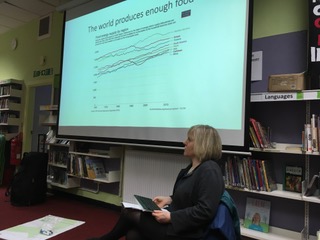On Thursday May 2nd Dr. Libby Oakden gave an extensive lecture on the food industry and its impact on our planet.
Despite the fact that planetary food production comfortably exceeds the requirements of the entire world population of 7.7 billion people, many in the developing world still either don’t get enough food, or that which they do get is not sufficiently nourishing, whilst in the developed world many eat far too much food, but not necessarily the right food.
The “green revolution” of the 1960’s, with the development hybrid wheat and rice varieties, seemed to solve the world’s food shortage at that time but exacerbated climate change and other problems linked to it, such as the mass extinction of flora and fauna across the planet’s continents and oceans, and the emission of vast amounts of CO2 and methane.
The propagation of just a few varieties of wheat and rice leads to a high probability that pathogens will evolve that will destroy most of the world production of either in a short time, as is currently happening with Cavendish bananas. This also leads to the loss of the varieties which have genes that could be used to fortify the current cultivated wheat and rice against any new pathogens.
Another significant problem with these cultivars is that they require synthetic fertilisers and pesticides, and the machinery to apply it, in order to achieve their large yields, all of which requires a lot of energy, and to date, this has been supplied using fossil fuels. This is true of most industrial agriculture, for it relies on cheap synthetic inputs instead of making use of properly maintained soil. The latter contains far more carbon and holds rainwater for much longer too, reducing the risk of flash floods, more of which we are seeing now, partly because of increased water in the atmosphere due to climate change.
The production of meat requires a great deal of plant based fodder unless the animals are fed exclusively from the land that they live on. It takes sixteen times as much fossil fuel to produce a human meal in the form of meat as it does in the form of plants.
The processed food industry is driven by profit, and makes it products as tasty and addictive as possible to maximise profits, with no consideration of the consequences. The foods are not part of the environment in which our DNA evolved, so we are not equipped to deal with it. The result is obesity and ill health as we ignore healthy food for foods that give us instant pleasure.
A great deal of food is wasted. In many less developed countries this happens during production and storage, processing and distribution. In the more developed parts of the world much of the waste is due to retailers not selling non perfect food and consumers throwing food away for a variety of reasons such as not knowing when food is still edible, and simply not finding it as tasty as expected.
To stop and reverse this damage to our environment and to our health, we need to change the way that land is used, and restore its natural resilience, and to reduce or, where possible, the synthetic inputs. We also need to to change the way that we eat by eating and wasting vastly less meat. Sustainable farming and development is vital for sustainable development, especially in areas of the world where the environment is not as forgiving to bad farming as in the northern hemisphere.
This will have to be done at all levels, with each of us deciding to make the change, but also with governments altering the taxation on unhealthy or environmentally damaging foods and by switching subsidies from damaging to sustainable farming. This will take a lot of public pressure on governments to surpass the pressure exerted on them from the vast agricultural and food industries.
We discussed this in groups of about five afterwards, which showed that even well educated and compassionate people find this switch difficult!
This was an interesting and very informative evening. The slides were rich in information and took quite of bit of digesting. Thank you Libby for the talk and for the examples in the form of nibbles at the end of it.
Review by SELHuG member Gregory Boon
You can find the slides to Libby’s presentation here:








